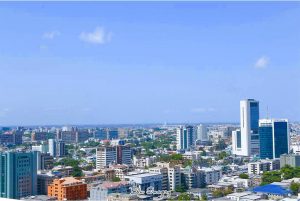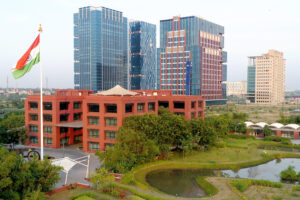Leading Finance Centres agree action plan for Green and Sustainable Finance
Milan, 13 April 2018 – For the first time, a significant number of the world’s leading financial centres have agreed a shared strategy for accelerating green and sustainable finance. The inaugural meeting of the international network of Financial Centres for Sustainability (FC4S) brought together 16 member centres – Astana, Casablanca, Dublin, Frankfurt, Geneva, Hong Kong, Liechtenstein, London, Luxembourg, Milan, Paris, Shanghai, Shenzhen, Stockholm, Toronto and Zurich – as well as a wide range of observers and partner organisations.
Sustainable finance is now recognised as one of the megatrends shaping the future of global capital markets. The FC4S Network flows from the work undertaken by Italy’s Ministry of Environment during Italy’s 2017 G7 Presidency, which endorsed and encouraged cooperation among financial centres. The Network itself was then launched in Casablanca in September 2017 with a mission to “exchange experience and take common action on shared priorities to accelerate the expansion of green and sustainable finance”. The Network was presented at the Italian Cultural Centre during the One Planet Summit in Paris, in December 2017. So far in 2018, it has expanded its international membership and defined a three-year working strategy with the support of Italy. UN Environment is establishing the network’s secretariat in Geneva with support from Swiss public authorities at both the federal and cantonal levels, as well as from private sources in Geneva.
Italy’s Ministry of Environment and the Comune di Milano hosted the Network during its two-day meeting in Milan. At the meeting, members agreed a five-point action plan to build international cooperation among financial centres on climate action and sustainable development:
– First, to strengthen links among members, including through regional hubs for Europe, Asia and Africa. The European hub has just been launched in partnership with Climate-KIC. These hubs will involve centres in the regions as well as internationally
– Second, to develop a robust benchmarking and assessment tool to enable financial centres to evaluate their progress and inspire further action. This will build on initial work presented in 2017 by I4CE and PWC.
– Third, to develop a joint statement on the importance of effective taxonomies for green and sustainable finance. A common language is key if green and sustainable finance is to develop in a trusted and dynamic fashion across the world.
– Fourth, to share experience on green digital finance, including through testing the Green Assets Wallet, a new approach to improve efficiency and transparency in the green debt market.
– Fifth, to gather the experience of financial centres in the development of the green bond market. This resulting briefing paper will be produced together with the Climate Bonds Initiative.
The Network will also explore in more detail ways of sharing efforts to build the capacity of financial professionals in green and sustainable finance and also connecting financial centres with the green and sustainable needs of economic regions.
Erik Solheim, Executive Director of UN Environment said: “Financial centres are the key places in the global economy which determine where capital flows. We’re delighted to convene this network of passionate leaders”.
Arabella Caporello, City Manager of Milan said: “We’re honoured to host the inaugural meeting in our city. Local authorities are on the front line in the challenge to achieve sustainable development goals and we believe that financial centres can drive the transition to a low carbon economy and inclusive society. The City of Milan is strongly involved in boosting sustainable development and specialised financial tools are a crucial point to achieve this goal”.
Francesco La Camera, Director General for Sustainable Development and International Affairs of the Italian Ministry of Environment, said: “The Information Centre for Environment-Climate Cooperation in Africa, another issue promoted by the G7 under Italian Presidency, might be an effective partner and support to the regional African Hub of FC4S”.
Nick Robins, Co-director of the UN Environment Inquiry into the Design of a Sustainable Financial System said: “The Milan meeting showed the real desire of leading financial centres to share experience and work together to make the transition to a sustainable economy cheaper, faster and smoother”.
Notes to Editors
Green finance is defined as finance that delivers environmental benefits in the context of sustainable development. Sustainable finance looks more broadly at environmental, social and governance (ESG) factors in both market practice and policy frameworks for banking, capital markets, investment and insurance to deliver the Paris Agreement on Climate Change and the UN Agenda 2030 Sustainable Development Goals. The past year has been marked by positive signs of progress in sustainable finance. Issuance of green bonds exceeded USD 155 billion in 2017, up from USD 82 billion in 2016.
Leading countries and regions are also introducing strategic roadmaps to harness their financial systems for sustainability, notably China, EU, Italy, Morocco and the UK. Canada has just established an Expert Group on Sustainable Finance.
Financial centres bring together a cross-section of different activities including banking, capital markets, insurance and investment, as well as regulation and new themes like fintech. It is this clustering effect that the Network will deploy through international cooperation for climate action and sustainable development.
The G7 Bologna Communiqué of Environment Ministers from June 2017 can be found here.
The Casablanca statement on financial centres for sustainability from September 2017 can be found here.
The UN Environment report, Accelerating Financial Centres’ Action for Sustainable Development, can be found here
The pdf version of this press release can be found here.
The Inquiry into the Design of a Sustainable Financial System was launched by UN Environment to improve the financial system’s effectiveness in mobilizing capital for sustainable development. More information is available at: www.unepinquiry.org
For more information, please contact:
Nick Robins, Co-director, Inquiry into the Design of a Sustainable Financial System
+41 79 197 9259








































